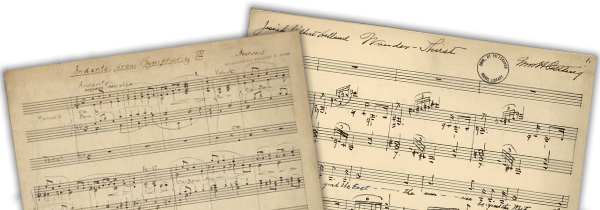
WARNING: This is an anti-abolition campaign song that features language rooted in racism and white supremacy.
According to the first edition of the sheet music, the campaign song "Little Mac! Little Mac! You're the Very Man" was deposited for copyright in Philadelphia in 1864 by Marion Foster, Stephen C. Foster's daughter. The lyrics support the Democratic presidential and vice presidential candidates George McClellan and George Pendleton over Republicans Abraham Lincoln and Andrew Johnson. The origins of "Little Mac! Little Mac!" have been disputed, but recent research sheds new light on the song.
In 1933, the Foster Hall Reproductions suggested that Foster wrote the music while the lyrics were written by an unknown author: "The words could not have been written by Foster. Lincoln and Johnson, the Republican candidates, and McClellan and Pendleton, the Democratic candidates, were nominated at the party conventions in the summer of 1864. Since Foster died on January 13, 1864, he could not have known who the candidates were to be." The thirteen-year-old Marion Foster could have written the words, or, as Foster-family descendants and Foster biographer John Tasker Howard suggest, the composer's sister Henrietta Foster Thornton may have written the words. Elsewhere Henrietta expressed anti-Lincoln and anti-war views that are similar to the views expressed in "Little Mac! Little Mac!"
Writing in 1990 in The Music of Stephen C. Foster: A Critical Edition, vol. 2, 1856-69, Steven Saunders and Deane L. Root contended that neither the lyrics nor the music were written by Foster, and they castigated the song to an appendix labeled "Works of Doubtful Authenticity." They wrote, "The music paraphrases two Foster songs: the opening vocal phrase is nearly identical to the beginning of 'Nelly Bly,' and the consequent phrase, as well as the chorus, are based on 'Better Times Are Coming.' If Henrietta Foster Thornton did write the text of 'Little Mac! Little Mac! You're the Very Man,' she may also have been responsible for assembling this musical pastiche. Foster himself never constructed a song by combining two previous works, and it is unlikely that this song existed with another text."
The notion that the song is a pastiche has been disproven by the discovery of another text for "Little Mac! Little Mac!" On July 11, 1895, an article appeared in the Pittsburg Press in which William Hamilton, a friend of the Foster family, recalled his work with the songwriter on behalf of Democrats in the 1856 election, when the two of them were founding members of the Buchanan Glee Club. Hamilton claimed to own a manuscript of a song from that year that he referred to as "one of the best" political songs with music and lyrics by Foster. Describing it as "a lively air" and claiming " we sang it well," he recited the lyrics, which bear a striking resemblance to "Little Mac! Little Mac!" and fit the music perfectly:
Keep it up, keep it up
All day long;
All day sing the campaign song.
Keep it up, keep it up
Till all turns blue;
We must beat Fremont and Fillmore, too.
CHORUS:
Hurrah! Hurrah! Hurrah!
Sound the rally for our own candidate;
Hurrah for Buchanan, of the Keystone state.
It seems, then, that the older view expressed in the Foster Hall Reproductions is more accurate than the view expressed in the critical edition. Foster most likely wrote music and lyrics in 1856 for a song that would eventually be published with revised and new lyrics as "Little Mac! Little Mac!" in 1864. But the authors of neither the Foster Hall Reproductions nor the critical edition knew how early Foster first wrote the song. Since the original version was composed in 1856, it is not a pastiche at all, for "Better Times Are Coming" was not published until 1862. It turns out that "Better Times Are Coming" is an adaptation of the earlier campaign song.
This calls into question whether the song's opening phrase was intended to resemble "Nelly Bly." The resemblance is so slight that it is likely coincidental. The pattern is a basic musical structure that appears across millions of compositions, and, as the critical edition points out elsewhere, Foster is well-known for repeating simple patterns of notes across songs. It seems likely that for "Little Mac! Little Mac!" Foster unintentionally composed a verse that slightly resembles "Nelly Bly."
Finally, despite the assertions in the Foster Hall Reproductions and the critical edition, it should not be so quickly assumed that Foster did not write lyrics in support of McClellan as a presidential candidate. McClellan's name was floated widely in the national press as an alternative to the incumbent Lincoln as early as 1862. Foster could have easily written a pro-McClellan song between the publication of "Better Times Are Coming" in 1862 and his death in January of 1864. If he did, the lyrics may have only required slight adjustments by Henrietta, Marion, or someone else to refer to Pendleton and Johnson following their nominations as vice presidential candidates in the summer following the composer's death.